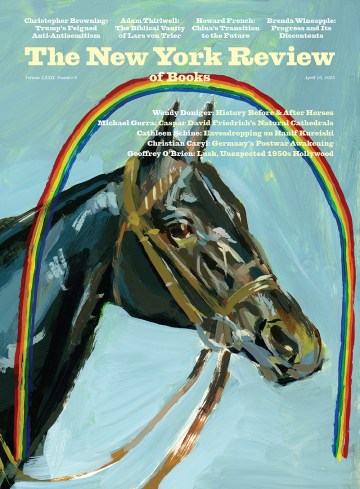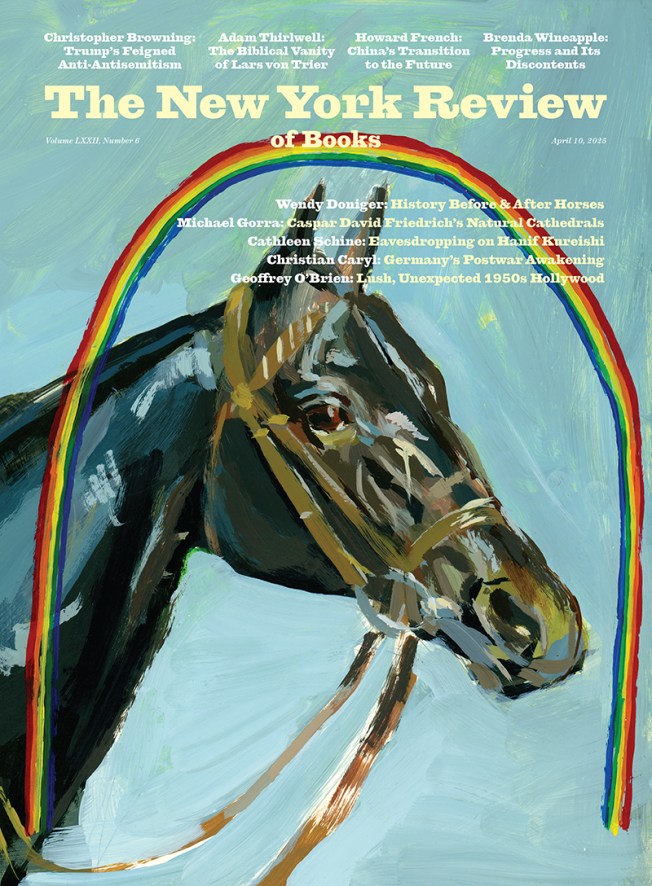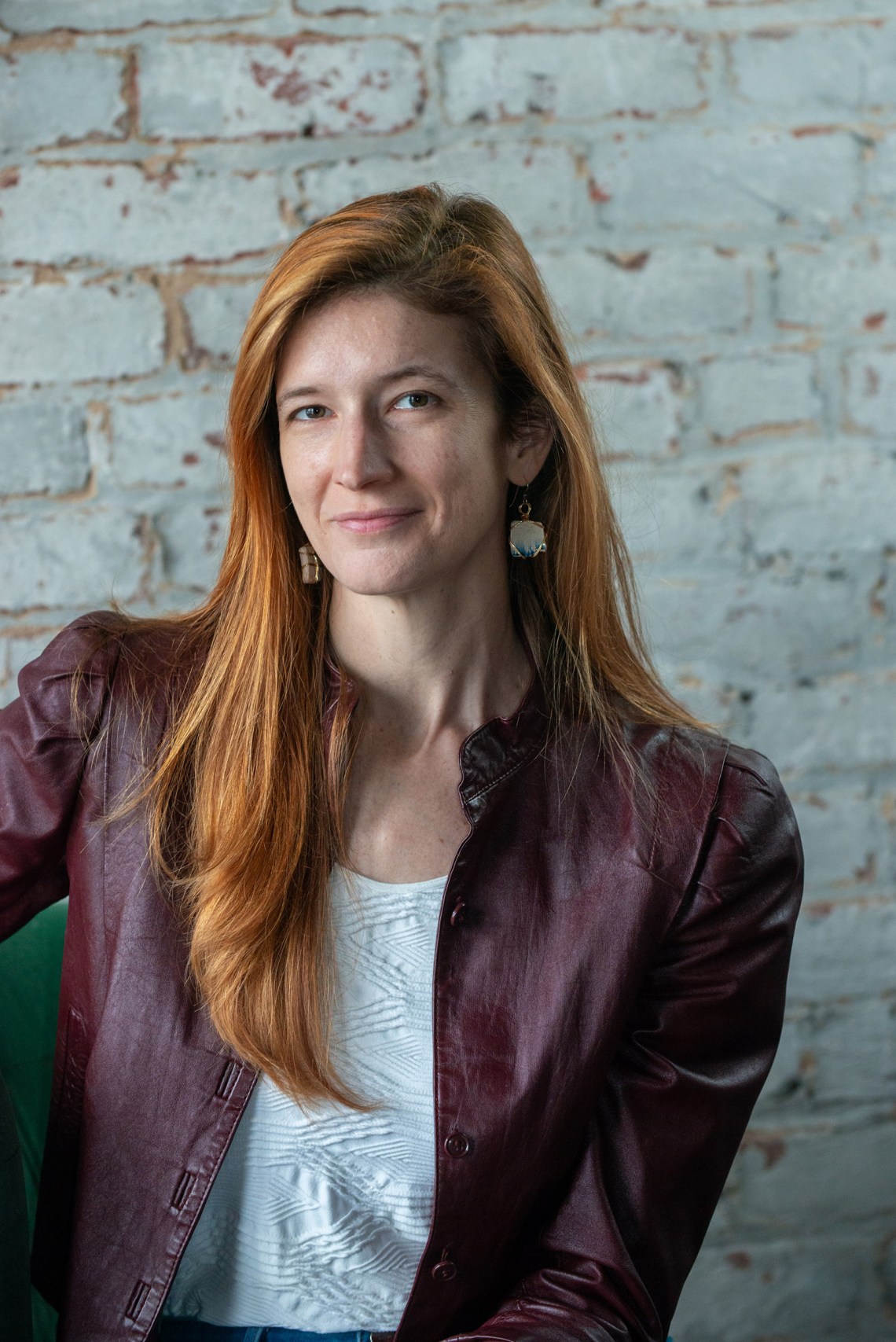This article is part of a regular series of conversations with the Review’s contributors; read past entries here and sign up for our e-mail newsletter to get them delivered to your inbox each week.
Russian human rights organizations estimate that there may be as many as 10,000 political prisoners scattered across the country’s penal colonies. Last summer, Joy Neumeyer wrote to fourteen of these imprisoned dissidents, unsure whether anyone would even receive her messages. To her surprise, some of them wrote back, enclosing heartfelt, roving reflections on their childhoods, their political awakenings, their last moments of freedom, and how they feel about their antiwar activities now. In our March 13 issue, Neumeyer writes about this “hidden archipelago of opposition that has endured and adapted” since Putin’s full-scale invasion of Ukraine in February 2022. In that time, the Kremlin has tightened speech restrictions to such a degree that anyone can be imprisoned for “discrediting” or “intentionally spreading false information” about the military—statutes broadly construed to include any criticism of the army’s actions in Ukraine. Some of those imprisoned have been convicted on the strength of pseudonymous social media posts.
Neumeyer, who received a Ph.D. in history from the University of California, Berkeley, is a journalist and historian of Russia and Eastern Europe and has been reporting from the region on and off for the last fifteen years. Her writing has appeared in the New Left Review, The New York Times, and The Nation. Her book A Survivor’s Education: Women, Violence, and the Stories We Don’t Tell, an investigative memoir about domestic abuse, came out last year.
Last week I wrote to Neumeyer to ask about working with vulnerable sources, interviewing via correspondence, and the challenges of covering Eastern Europe in this time of upheaval.
Dahlia Krutkovich: How did you approach the task of interviewing political prisoners via correspondence?
Joy Neumeyer: Initially I wasn’t sure what would make it past the prison censors, much less what prisoners would feel comfortable disclosing to a foreign journalist, so I included both broad questions that would give them a lot of latitude to determine what they wanted to discuss and questions tailored to their specific backgrounds and situations. To my surprise, in their first responses some of the prisoners I contacted shared wide-ranging reflections and confessions—their ideas about history and politics, their senses of how they’d been assisted or betrayed, and their degree of fear or acclimation. Some prisoners seemed to feel that they didn’t have much to lose, while others hoped that public attention would help them get out sooner or improve their conditions. I found that the inherent limitations of a letter foster intimacy; its contents feel precious.
Even prisoners who have friends, family, or sympathetic strangers supporting them tend to feel depressed and isolated, so they can be receptive to signs from the outside that they are not alone or that their purported crimes weren’t totally in vain. I think this stems in part from the nature of the accusations against them. The Soviet penal code had a political category—the infamous Article 58—which made it clear that an individual was being punished for dissent or nonconformity. Today the Russian government classifies different forms of protest as regular crimes (often under terrorism or extremism statutes, as well as amendments introduced after the 2022 invasion of Ukraine that effectively ban any criticism of Russian foreign policy), and state media presents them accordingly. These prisoners want their actions and their persecution to be recognized as what they are: political.
You explain that it’s surprisingly easy to get in touch with inmates, but what was it like trying to talk to their supporters and family members? How did you make contact? Did they immediately trust you?
Whether to individuals or prisoner support groups and advocacy organizations, I almost always began by reaching out on the messaging app Telegram, which is widely used in Russia. Activists and prisoners’ loved ones are eager for cases to be publicized and extremely helpful in sharing information, though they often didn’t want their full names used. Lawyers usually chose not to comment, as they are most aware of the risks involved in talking to a stranger online. There are people facing heavy sentences over interactions they had on social media with Federal Security Services (FSB) agents posing as antiwar activists. The lawyer I quote in the piece decided to talk to me only after I went through several steps to verify my identity.
I was also interested in stories of returning to “normal” life after prison, and thanks to sources who put me in touch, I was able to interview two prisoners who had recently gone home. One of them didn’t want to use his real name because he was trying to get his old job back and feared being sent to prison again. He thought his colleagues didn’t know what happened to him and aimed to keep it that way. Still, some part of him wanted to talk about experiences he can’t forget but feels he has to hide—especially being tortured by the FSB and other prisoners, which left him traumatized. Political prisoners can become pariahs, especially if they didn’t belong to an oppositional milieu before their arrest. Other people often don’t want to be seen as guilty by association, which only underscores the courage of those who go out of their way to help.
Advertisement
American news outlets are reporting that Russia and the US have conducted talks without the Ukrainians to sketch the outline of a war settlement. What might domestic Russian opposition to Putin look like if his “special military operation” is no longer a live issue? How robust is the ecosystem of dissident organizations in Russia and abroad?
I would first note that any possible settlement won’t improve the lot of antiwar prisoners. In fact, it would further validate their persecution as “traitors” who tried to prevent what Putin will present as a historic victory. Over the past several years the Kremlin has crushed dissenting civil society organizations that had been active nationally. Meanwhile diaspora groups have struggled to come up with a unifying message for Russians at home and abroad to rally behind, especially after Alexei Navalny’s death deprived the opposition of its leader. Though everyone agrees on the need to end the war, what Russia should look like afterward is a matter of fierce debate.
That said, reporting this essay made clear to me how many Russians continue to support opposition-minded initiatives (such as the Open Space collective and the human rights project OVD-Info), whether by volunteering, donating, or simply following them online. By design, these organizations operate discreetly and do not directly challenge the status quo, but they maintain active networks of people whose views are at odds with the Kremlin’s. There is considerable energy to be tapped if people refuse the pact that bound Russian political life before the full-scale invasion, by which the populace agreed they wouldn’t get involved in politics so long as Putin’s government provided stability. As the political prisoner Lyudmila Razumova captured very movingly in one of her letters, the hideousness of this war has motivated some Russians to become politically engaged for the first time in their lives.
A few generations of American journalists went to Russia between the fall of the Soviet Union and the beginning of this war to cut their teeth as writers and reporters. The prospect of doing so today as a Western passport holder seems extremely dangerous, if not logistically impossible. What kind of advice would you give to someone who is interested in covering Russia, or the region more generally?
When I moved to Moscow on a Fulbright fellowship in 2010, I became one of the many Anglophones with rudimentary Russian who started writing for The Moscow Times. There was a huge infrastructure of grants, media organizations, and social contacts that has now vanished or been put on hold. A lot of Russians are very online and eager to communicate with the outside world, though it’s safe to assume that the security services will have access to any messages you exchange. But now the fallout from the war in Ukraine comes with the opportunity, even the imperative, to study Russia more in the world—to learn from people in Central and Eastern Europe, the Baltic states, the Caucasus, and Central Asia and realize how knowledge of their languages, cultures, and history can deepen our understanding of the region.
Many of the journalists and academics who started going to Russia after the invasion of Iraq, myself included, saw American militarism as the ultimate evil in the world and tended to adopt a reflexively defensive attitude about our host country. Immersion in Russia’s culture sometimes came at the expense of comprehending its neighbors. For example, when I studied Russian literature, I of course read Pushkin, the national canon’s most sacred figure, but only after the full-scale invasion did I discover “To My Russian Friends” by Adam Mickiewicz, a poet claimed by Poles, Belarusians, and Lithuanians who grew exasperated with Pushkin over his support for the tsar and repression of the Polish uprising of 1830–1831. Getting a fuller picture of Russia requires examining legacies of domination as well as resistance and solidarity.
You are mostly based in Warsaw. What’s the view from Poland like right now?
Overall, the mood in Poland is more optimistic than it is in the US. The right-wing Law and Justice party was voted out of power in fall 2023, and several prominent former officials are now facing criminal trials for abuses they committed in office. While the centrist coalition that succeeded them has yet to deliver on some of its major promises, like ending the national abortion ban that was passed in 2021, the Polish example offers hope that authoritarianism has an off-ramp—even if it’s messy. Most Poles, who are enthusiastically pro-NATO, are aghast at Trump’s admiration for Putin and denigration of Ukraine. After centuries of partition and occupation by Russia and other empires, the fear of invasion is never too far from Poles’ minds.
Advertisement
Poland is a hub for millions of people who fled from Ukraine, as well as Belarus and Russia, and the sounds of other Slavic languages fill the streets. Though there is some resentment toward the social benefits Ukrainians have received, it is outweighed by goodwill. Unfortunately, the Polish government, in keeping with anti-migrant sentiment across the EU, has been much less welcoming to people from the Global South who have tried to enter through Poland’s border with Belarus. Solidarity is bounded by racial and cultural prejudice, to the frustration of activists who fight to expand it.



